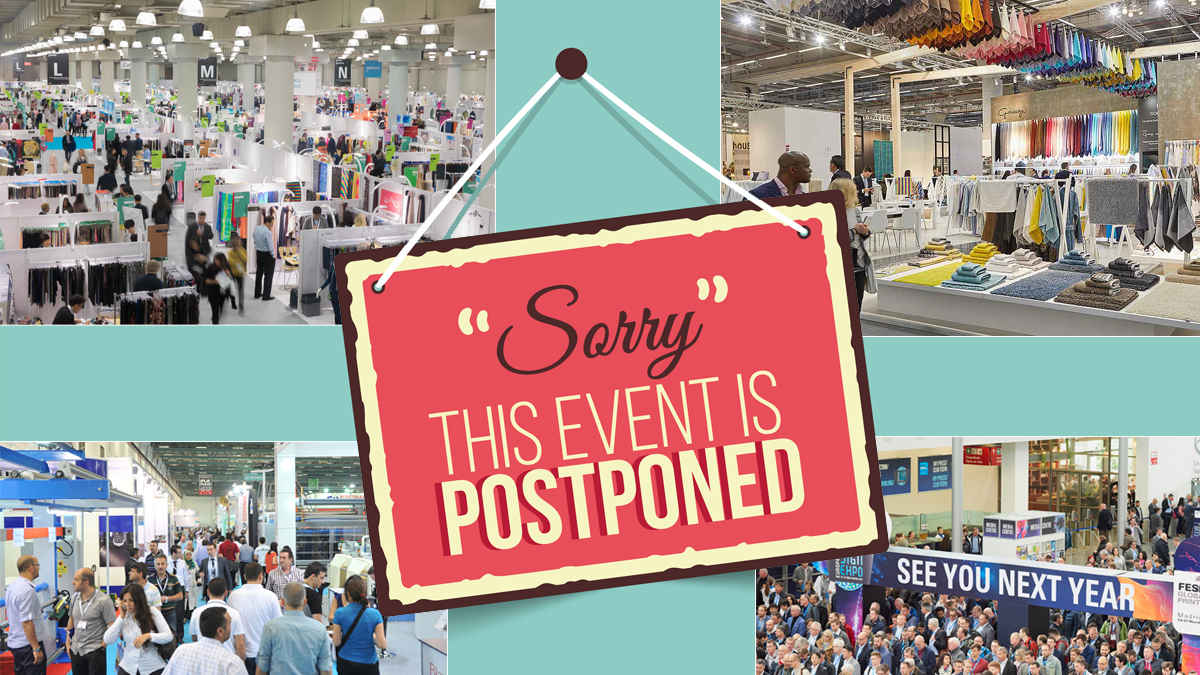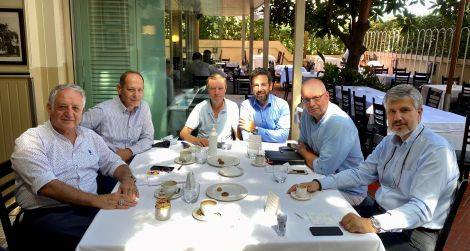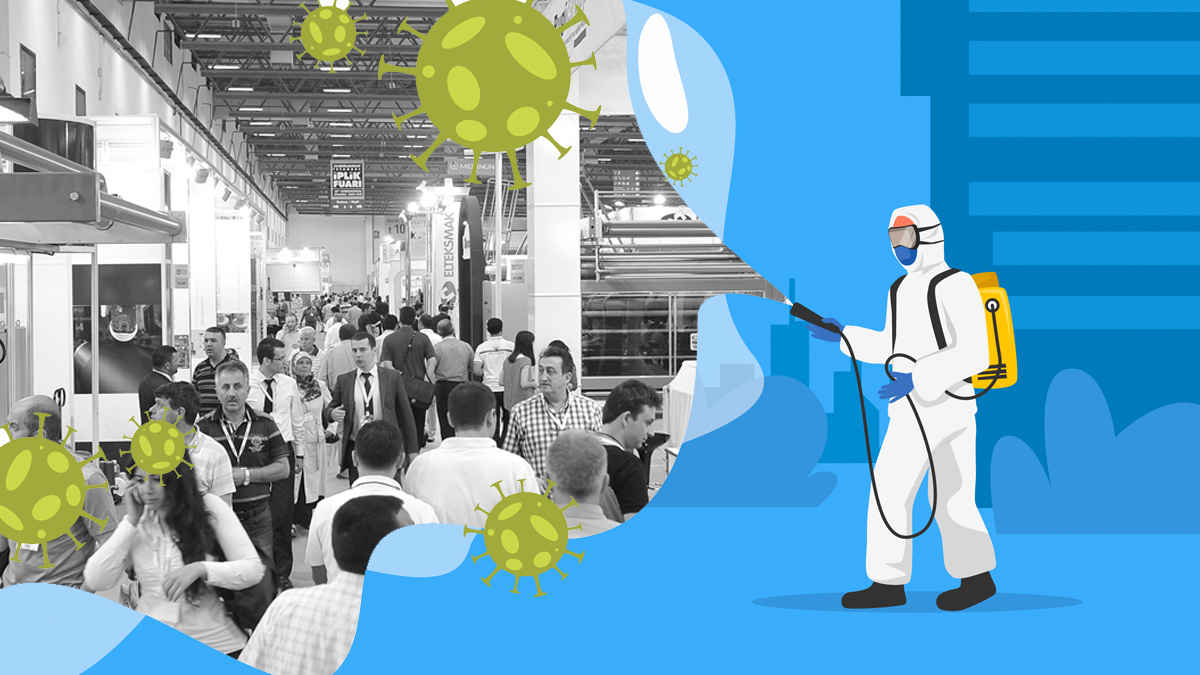Starting at the end of 2019, the Covid-19 outbreak continues with all its severity. While in some countries a new record is broken in the number of daily cases every day, scientists continue to develop an effective vaccine against the virus. The World Health Organization (WHO) does not foresee any effective vaccine available until mid-2021 at the earliest. This means that we must continue to strictly adhere to hygiene rules with the use of masks and protective equipment, creating social distance and disinfection. The ‘new’ normal conditions are indispensable for our daily life. Here are the effects of the pandemic on fairs and some opinions on it.
Turkey is among the countries that successfully combat the Covid-19 outbreak with the measures taken after March with the first encountered case. The contact tracing teams have achieved important work by detecting many positive cases before they interfere with the society. When the shocking effect of the first wave was over, the restrictions were eased in the new normal conditions as of June with the pressure brought by the economic life, and social life again gained a significant density. With those returning from vacation and their hometown, the number of daily cases and the number of patients in intensive care increased rapidly.
The number of daily cases, which went down to 600-900 people, has exceeded 1500 and continues to increase. As of September, we are experiencing the peaks of the 2nd wave, according to the official statement made by the Ministry of Health. Moreover, there is no clear global development regarding the vaccine yet. Our hope is that the pandemic will cease as soon as possible, the number of deaths will decrease and the wheels of the economy will turn normally.

The pandemic effects: fairs were cancelled one after the other
Following WHO’s announcement of Covid-19 as a pandemic, events which brought together large crowds such as fairs and congresses, made postponement and cancellation announcements one after another. This was the right move. However, in terms of economy and individual sectors, cancelling fairs means the break of the whole chain. This rupture will affect us for a long time with its serious negative effects in terms of both workforce and cash flow.
An unfamiliar quarantine process started in China, the first country where the virus appeared, and naturally, the first fair cancellations started in this country, especially Wuhan. When we look at the textile industry; Intertextile Shanghai Apparel Fabrics, Yarn Expo and Intertextile Shanghai Home Textiles fairs organized in Shanghai by Messe Frankfurt, one of the world’s largest fair companies active in the Chinese market for 30 years, has been cancelled. After these cancellations; ISPO Beijing, Domotex Asia China Floor, Chic fairs, Sign China, one of the digital printing technologies fairs Appexpo shared the same fate in2020. After the pandemic spread rapidly to neighbouring countries, IGATEX, ICADEX organized in Pakistan; DTG in Bangladesh and Apparel Sourcing Week in India was postponed.
Undoubtedly, the most important textile and printing industry fairs of 2020 would be ITM, INDEX, DRUPA, FESPA Global, FESPA Eurasia and ITMA ASIA CITME. But these fairs had to be postponed for the same reason. While the fairs first announced a date within this year, they then gave a new date to 2021. The FESPA Global Print fair, which was planned in March but was postponed due to the pandemic, first announced the date of October 2020, and then the date was announced as March 2021. There were also fair companies that followed a more guaranteed path. ITMA ASIA CITME, organized by CEMATEX, was postponed directly to June 2021, and DRUPA, which is expected to take place in June and organized by Messe Düsseldorf, was postponed to April 2021.
The scenario is the same in Turkish fairs
ITM 2020 organizers had to postpone the fair to be organized in June; first to July and then to June 2021 with the best decision. The downside is that there is only 10 days between ITM and ITMA ASIA CITME fairs; which are the cornerstones of the regions where they are organized. Is Turkey’s and the region’s most important textile machinery have received an opinion from participants for possible new date for the postponed ITM fair? For example, the message that comes under a social media post; that states that the fair was postponed for the second time is actually quite clear.

Describable as the two opponent fair in Turkey; FESPA Eurasia and Sign Istanbul have postponed and let the media and participants have fresh breath of air actually. While Sign Istanbul was postponed just in time so to speak; FESPA Eurasia was cancelled 2 months ago with the advantage of being in December. The cancellation decision of these two fairs at the same time actually caused some question marks. We hope that for our next article; we can get answers from the representatives of the two fairs that will satisfy us.
No refunds for exhibitors, ‘mandatory’ attendance to the next fair.
Before news of the cancellation and postponement; we learned through our interviews with the participants of the fairs organized in Turkey; that some of the fair companies said that they will organize the fair no matter what happens. Some organizers gave the answer that such a situation could not be the case for the companies that wanted the refund of the fair participation fees. Of course, these situations are legally determined within the framework of the contract between the fair company and the participating company. However, the Covid-19 pandemic; which has had its effects all over the world; causes an unprecedented recession in the economies of the country. Therefore, we leave the evaluation of who is right and who is wrong issue to you.
Apart from the fairs we mentioned, some of the important fairs of the sector; which hosted thousands of visitors, made a single postponement; while some of them showed that they did not care about the pandemic by delaying 3 times. Moreover, several regional fairs planned to be organized towards the end of 2020; continue to announce their new participants, let alone the postponement-cancellation announcement. Is the economy getting ahead of human health? Or has the Covid-19 outbreak become a sales tactic? Using the cancellation of other fairs to their advantage; do they desire to guarantee 2021 participation with a new last minute date announcement? It is certain that companies with million TL turnover will not fall into this kind of trap.
Regardless of when the events took the cancellation decisions; we learned that the biggest participants of the postponed fairs decided not to participate in the fairs planned to be organized in 2021; and held cancellation negotiations with the fair companies. Although it is a scary scenario; it will not surprise us that such news will be announced in the coming period.
The pandemic effects: the favourite of the fall 2020 season Virtual Fairs
In the vacuum of physical fairs, first hybrid and then virtual fair organizations became prominent. A new virtual fair date is announced almost every day. In addition to the large fair companies, people, persons and fair companies; who did not or could not organize a physical fair started to organize virtual fairs. Anyone can organize an average virtual fair with an infrastructure of 20,000 TL and package software of 50,000 TL. So will that really be able to fill this gap and contribute more than once hugely popular Directory sites? Virtual fair events that have been tried in the last 3-5 years could not go beyond 1-2 organizations.
Virtual fair infrastructures have both pros and cons. For example, we cannot be sure why a company that has a good SEO structure; and can already gather potential customers with 3rd party software needs virtual fair participation. In our opinion, the most beneficial segment of virtual fairs is the smaller companies; that are likely to have difficulty in realizing their own launch economically and technically. For large companies, we think that there is no return beyond a prestige. With the economic support packages brought by our government in the field of informatics; the number of virtual fairs will increase gradually for a while, and the fair; which attracts a significant number of participants and makes a difference with its system; will be permanent just like physical fairs.
From now on the system will speak, not the brand.

